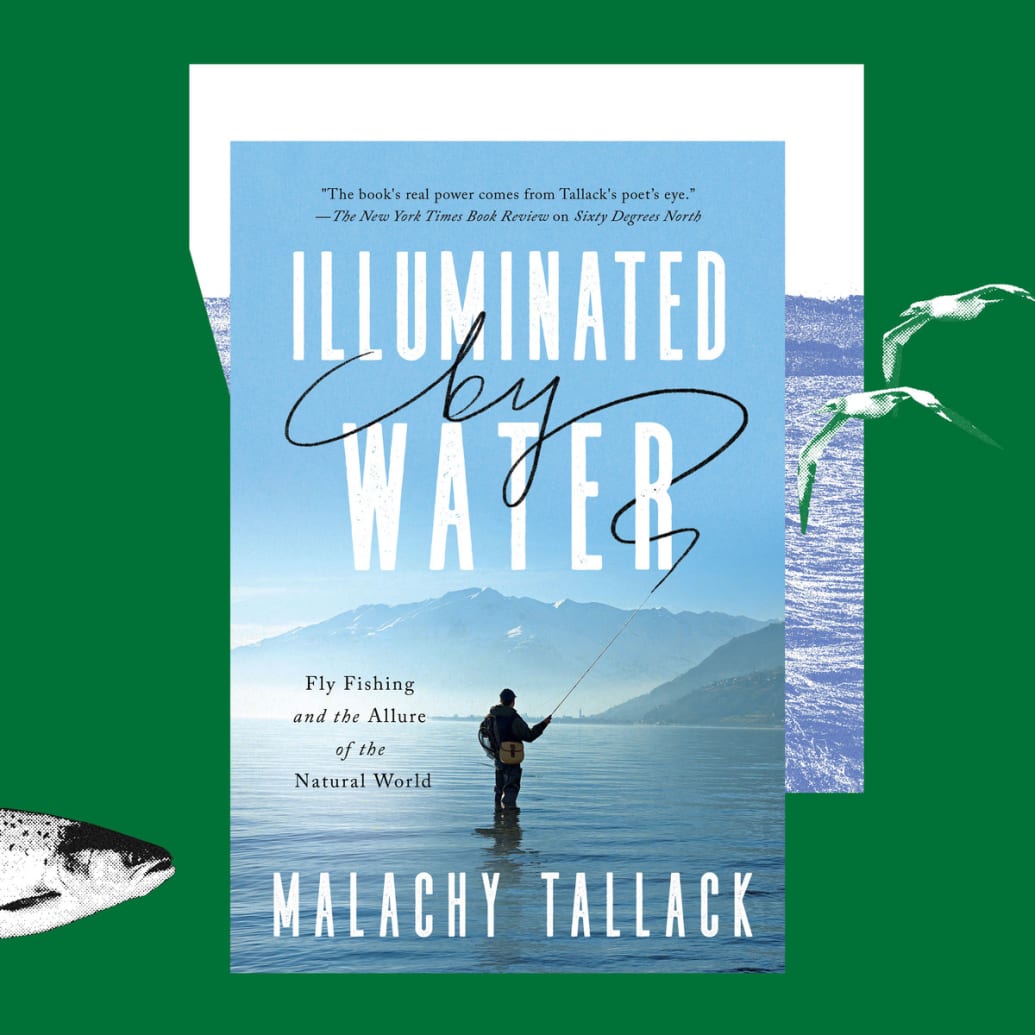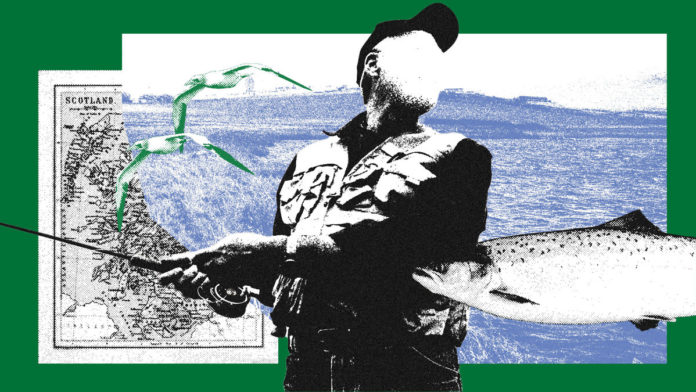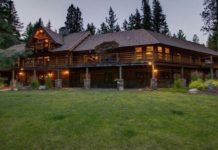A text message arrived from my brother, with a map attached. It was a screenshot, a rectangle of land and water, cropped from a digital Ordnance Survey chart. The space it covered wasn’t large—just two or three square miles at most—and it wasn’t somewhere I knew. Or not precisely. Of the dozen or so names that were present on the map, I recognized only one of them for certain: a narrow Atlantic inlet at the north of the picture, which located it with some degree of specificity. But even without that clue, I’d have known that it was somewhere in the Shetland Islands—where he lives, and where we both grew up. Just the look of the words, the juxtaposition of Norse and English names: it could hardly have been anywhere else.
Protruding from one side of this image was a little road, a track, which petered out in the space between the sea and a steep hillside. South and west of there, a hundred and fifty meters up the hill, were four small lochs, dotted unevenly around. Planted in one of them was a purple flag, a digital X to mark the spot.
I have fished in Shetland for thirty years now, on and off, and I had never heard of any of these lochs. Not once. Their names were entirely new to me. To some extent that’s not so remarkable; there are at least five hundred lochs in the islands, and I’ve visited only a fraction of those. But I’ve spent a lot of time looking at maps, and a lot of time listening to anglers tell stories; and in all those years I’d neither noticed nor heard of these lochs.
What was particularly surprising, then, was the message behind the purple flag. It told me that this loch held treasure. The night before, my brother had been staying in the area, on a weekend break with his family. On a whim, once the children went to bed, he’d taken his fly rod and walked up the hill, and cast into the first water he found. Judging by the excited texts I received that night and the following morning—after he got up at 5 a.m. to go back a second time—this was a place that I really ought to have known about. There were big fish feeding in the margins, he said, cruising in stony, shallow water. He couldn’t get them to take. Not that time. But they were there, and so he’d return.
Growing up in Shetland, fishing meant freedom. It meant being able to wander and explore and to stop at any loch you fancied and cast a fly. It meant a choice of waters that would take years, even decades, to exhaust. Of those five hundred lochs in the islands—nearly all of which hold trout—the vast majority are open to members of the local angling club. I know of only three or four, in fact, which are not.
This is how most of the fishing in my life has been done: with the great luxury of whim. I’m driving to a loch I last visited five years ago, and which, for reasons I can’t explain, has been lately on my mind. But as I turn a corner, on the one-track road that will take me the last few miles, I see something else. I see a loch, not far from the road. It’s a loch I have passed many times, but have never really noticed until now. And now I can’t help but notice, for the surface is calm, and there are fish rising all over. Small fish, maybe, but it’s hard to tell. I slow down, park the car beside a gate and get out. I set up the rod, then hop the fence.
To be able to do this, to have such a rich, expansive choice of places in which to fish, is a rare thing indeed. Rare in the UK, probably rare worldwide. Certainly, it’s not like that where I live now, in mainland Scotland. Here, almost every piece of water requires another fee, another membership. Some are affordable—and to those I am, by necessity, drawn. Others are considerably less so. Then, there are the private clubs, or ‘syndicates’, about which there is most often no information to be found online. Membership of these tends to be available by invitation only. I have never received such an invitation, and perhaps never will. I don’t know the right kinds of people, and I don’t know where to find them.
Inevitably, then, the freedom I once found in fishing has been curtailed since I left Shetland, and the ability to connect with place in this way has likewise been limited. Now, the degree of freedom that’s available, and where it can be exercised, is dependent upon who I know, and on the fullness or otherwise of my wallet. (Which is not unusual when it comes to freedom, I suppose.)
There is an irony to this, though, an irony that only adds to an angler’s frustrations. For here in Scotland, we possess a kind of liberty that is both precious and yet, too often, taken for granted. There is a right to roam in this country, a right to walk and wander, responsibly, through both public and private land. It’s a right that exists elsewhere in Europe—in the Nordic countries, for instance—but not in England, and certainly not in the United States.
But this right to roam exists alongside a distribution of land that is, frankly, grotesque. The historian Jim Hunter has claimed that Scotland possesses ‘the most concentrated, most inequitable, most unreformed and most undemocratic land ownership system in the entire developed world.’ Fewer than five hundred people own half of the private land in the country. Enormous estates—many of them belonging to landlords who live most of the year elsewhere—are run for the benefit of the very wealthy, who pay excruciating sums of money to holiday in the Highlands, to shoot stags and grouse, catch salmon and sip whisky.
I can walk across these estates if I want to. I can jump up and down and wave my arms around in sight of the lords and ladies and shipping magnates and tech billionaires for whom the land is a playground. It’s not much compensation for the inequities of the system, but it’s important nonetheless.
The problem here is essentially the exact opposite of the one faced today by American anglers. Here, I can walk the banks of pretty much any piece of water in the country. I can peer into its depths, and dip my toes beneath the surface. If I want to, I can swim. But in the vast majority of cases, I cannot cast a fly without paying someone for permission.
In the US, there is a great deal more water under public ownership, for which each state offers fishing licenses. Furthermore, in many of those states all water is considered to be public property. Anglers there are presumed to have the right to fish, so long as they can gain access. Which is where the problem lies. Landowners alongside that water can, and do, prevent people from reaching it. Trespassing laws are used to keep anglers out, and to make money from what is, in theory, a common good.
Photo Illustrations by Luis G. Rendon/The Daily Beast/Getty
In Scotland, I can reach the water, but I can’t always fish; in the US, you can fish, but you can’t always reach the water.
For those seeking freedom and escape, there are still options. You can throw money at your hobby, if you’ve got it. You can fly to Florida and catch tarpon; or, better still, you can take the boat to Shetland. But there are other ways, too, and some anglers are now looking for adventure in precisely those places where it might seem least likely they would find it.
Matthew Miller, in Fishing Through the Apocalypse, has written that ‘in a world where there are almost no unexplored, uninhabited places left, perhaps the postindustrial wastelands will become the new frontier. The places where the dreamers, the outcasts, the renegades, and those with low-grade utopian visions will go to escape the conformist world.’
For anglers, that new frontier is the antithesis of the places with which our sport has most often been associated: the ‘wild’, the ‘remote’, the ‘unexplored’. Today, if you’re looking for exciting trout fishing, you may well find it closer to home, in towns and cities. The rivers that run through these urban spaces—which are where they are because of those rivers— were once filthy. Many were biologically dead. They were covered with concrete, banished to drains and culverts. They were ignored and forgotten. They were treated like sewers. But that’s changing.
In an essay documenting his search for trout in the half-hidden streams and rivers of London, the writer and conservationist Charles Rangeley-Wilson—a literary descendant of Negley Farson if ever there was one— described his quest as being ‘about looking for the edge: the edge of destruction, the edge of what is holding on.’ What he means, I think, is this: Fishing has always been a way of joining the human to the non-human world. It is a means of extending, of reaching, from one into the other. To further that reach, anglers often choose to put themselves in the way of wildness. It is there, in undomesticated places, that we are most aware of that border, that edge, where one world melts into another.
The edge that Rangeley-Wilson is referring to, though, is not to be found by exploring outwards. Instead, it is moving in the other direction. It is the wildness that is now putting itself in the way of us. The restoration of urban rivers, supported, in the UK, by organizations like the Wild Trout Trust, is encouraging wildlife, including fish, to return to our towns and cities. That process of returning, of reclaiming, is a hugely important one. These are places that human beings poisoned, despoiled and disfigured, so unconcerned were we by the health of our surroundings. To see those surroundings now being clawed back, to see our damage being gradually undone, to see this ‘edge of destruction’ pushed tenaciously towards us, is really quite something.
Anglers are drawn to these recovering waters because the return of trout seems to prove something about the world. Something good. Something marvelous. Something hopeful. And what could be more freeing, more exhilarating, than that?

Excerpted with permission from ILLUMINATED BY WATER by Malachy Tallack. Published by Pegasus Books.
Credit: Source link































